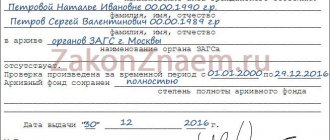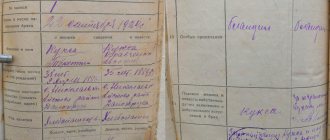Presence of another registered marriage for at least one of the persons entering into marriage
It turns out that if there is already a registered marriage that has not been dissolved, it is impossible to marry another person.
- Where is such a ban contained? In the second paragraph of Article 14 of the Family Code of the Russian Federation.
- Why? This is explained by the monogamous nature of family relationships in the Russian Federation. One person can only be in one registered marriage and cannot marry another person until the previous marriage is dissolved. Moreover, Article 25 of the RF IC states that “spouses do not have the right to enter into a new marriage until they receive a certificate of divorce from the civil registry office at the place of residence of any of them or at the place of state registration of the marriage.” In simple words: if at least one of the persons entering into marriage has already been married before, he must submit a certificate of dissolution of such marriage to the registry office when concluding a new marriage.
- What to do? Take care in advance to dissolve the previous marriage and prepare a certificate of such dissolution if a new marriage is planned.
Case N1388-O.
Laws and codes » Family Code of the Russian Federation » Section II. Conclusion and termination of marriage » Chapter 3. Conditions and procedure for marriage » Article 14. Circumstances preventing marriage » Case N1388-O. CONSTITUTIONAL COURT OF THE RUSSIAN FEDERATION
DEFINITION
dated June 23, 2015 N 1388-O
ABOUT REFUSAL TO ACCEPT A CITIZEN'S COMPLAINT FOR CONSIDERATION
STEAM LARISA IVANOVNA FOR VIOLATION OF IT
CONSTITUTIONAL RIGHTS UNDER ARTICLE 14
FAMILY CODE OF THE RUSSIAN FEDERATION
The Constitutional Court of the Russian Federation, composed of Chairman V.D. Zorkin, judges K.V. Aranovsky, A.I. Boytsova, N.S. Bondar, G.A. Gadzhieva, Yu.M. Danilova, L.M. Zharkova, G.A. Zhilina, S.M. Kazantseva, M.I. Cleandrova, S.D. Knyazeva, A.N. Kokotova, L.O. Krasavchikova, S.P. Mavrina, N.V. Melnikova, Yu.D. Rudkina, O.S. Khokhryakova, V.G. Yaroslavtseva,
having considered the possibility of accepting the complaint of citizen L.I. Helmsman for consideration at a meeting of the Constitutional Court of the Russian Federation,
installed:
1. In her complaint to the Constitutional Court of the Russian Federation, citizen L.I. Ruleva challenges the constitutionality of the provision of Article 14 of the Family Code of the Russian Federation, according to which marriage between persons is not allowed, at least one of whom is already in another registered marriage.
As follows from the presented materials, L.I. Ruleva, believing that her mother, when marrying citizen Sh., was in a registered marriage with citizen R. (the applicant’s father), applied to the court with a demand to recognize the marriage re-concluded by her mother as invalid.
By the ruling of the court of general jurisdiction in satisfying the demands of L.I. The helmsman's request to invalidate the marriage concluded between Sh. and the plaintiff's mother, who died at the time of consideration of the case, was refused. At the same time, the court pointed out the lack of evidence of L.I. The helmsman that her father was alive at the time of the conclusion of the disputed marriage, and also that at his place of residence there is no information about the dissolution of the marriage he entered into with the plaintiff’s mother.
In satisfying the petition of L.I. The helmsman's request to revise this determination due to newly discovered circumstances (as such a circumstance, the plaintiff indicated documentary evidence of the death of her father after the conclusion of the disputed marriage) was also refused.
According to the applicant, the contested legal provision contradicts Articles 2, 15, 17, 18, 35, 46, 47 and 52 of the Constitution of the Russian Federation, since due to the uncertainty of its content it gives rise to the possibility of its arbitrary application.
2. The Constitutional Court of the Russian Federation, having studied the submissions of L.I. The helmsman finds no grounds for accepting this complaint for consideration.
The provision of Article 14 of the Family Code of the Russian Federation, which refers to the circumstances preventing marriage, the presence of at least one of the persons wishing to get married in another registered marriage, contrary to the opinion of the applicant, does not contain uncertainty, is aimed at implementing the basic principles of state policy of the Russian Federation Federations in the field of family relations, which, as indicated by the Constitutional Court of the Russian Federation, are characterized, in particular, by the principle of monogamy (monogamy), based on the attitude towards marriage as a biological union of only one man and one woman, which does not allow simultaneous presence in several marriages ( Determination dated December 18, 2007 N 851-О-О).
Thus, the challenged legal provision cannot be considered as violating the constitutional rights of the applicant specified in the complaint.
The establishment and investigation of the factual circumstances that served as the basis for the courts’ refusal to satisfy the claims of L.I. The helmsman's requirements are not within the competence of the Constitutional Court of the Russian Federation, as established by Article 125 of the Constitution of the Russian Federation and Article 3 of the Federal Constitutional Law “On the Constitutional Court of the Russian Federation”.
Based on the above and guided by paragraph 2 of Article 43, part one of Article 79, Articles 96 and 97 of the Federal Constitutional Law “On the Constitutional Court of the Russian Federation”, the Constitutional Court of the Russian Federation
defined:
1. Refuse to accept for consideration the complaint of citizen Larisa Ivanovna Ruling, since it does not meet the requirements of the Federal Constitutional Law “On the Constitutional Court of the Russian Federation,” according to which the complaint to the Constitutional Court of the Russian Federation is considered admissible.
2. The ruling of the Constitutional Court of the Russian Federation on this complaint is final and not subject to appeal.
Chairman
Constitutional Court
Russian Federation
V.D.ZORKIN
The presence of a prohibited degree of relationship between persons wishing to marry
The Family Code interprets this degree of relationship as follows: persons cannot marry if they are close relatives. In this case, “close relatives” means:
- relatives in a direct ascending and descending line (parents and children, grandparents and grandchildren);
- full and half (having a common father or mother) brothers and sisters.
At the same time, the law does not prohibit marriages between more distant relatives (for example, between an uncle and a niece), between in-laws, between half-brothers and sisters and other distant relatives.
- Where is such a ban contained? In the third paragraph of Article 14 of the Family Code of the Russian Federation.
- Why? The prohibition of marriage between relatives is the unshakable foundation on which society stands. As civilizations developed, the gap between acceptable standards of behavior in this part became larger, and the degree of kinship allowed by law between persons entering into marriage became further and further.
Prohibition of incest
An obstacle to marriage in all democratic countries is the close relationship of the spouses. This ban is due, first of all, to the biological component of the issue. Incest causes deep pathological and genetic abnormalities and health defects, which has been proven by science and history. For example, children born in such a union, more often than the average, suffer from delayed speech development and mental retardation.
The prohibition is also due to a moral aspect. The legislation of many countries provides for criminal liability for such unions. In the Russian Federation, this practice is not legally established. But the established fact of incest as a result of marriage registration serves as the basis for initiating a lawsuit to declare the marriage invalid. The subject of the claim may be the prosecutor or one of the spouses.
The category of citizens belonging to close relatives is regulated by Article 14 of the RF IC. Based on the norm, unions are prohibited:
- parents-children,
- grandchildren, grandparents,
- full and half-siblings (that is, born from two common parents or having a common father or mother).
The legislation does not establish the mandatory availability of documents confirming kinship. These connections serve as a prohibition of marriage, regardless of their legal registration.
This is an exhaustive list that is not subject to expansion in law enforcement practice. Other family relationships do not serve as an obstacle to concluding an official union. Half-brothers and sisters who do not have common blood parents are not considered close relatives for the purposes of this matter. Their legal status serves as property, not kinship.
A similar rule applies to the relationship of one of the spouses with the blood relatives of the second spouse. The legislator allows cousins, nephews and aunts, uncles and nieces and all other categories of relatives to enter into a marriage, subject to other criteria (age, legal capacity, free expression of will).
A special case
The inadmissibility of a marriage between adoptive parents and adopted children is determined by moral principles. Despite the lack of consanguinity, the legislator proceeds from the position that the legal registration of adoption entails a complete transfer of the totality of rights and responsibilities of children. Consequently, this category is considered as a forbidden child-parent union.
The prosecutor or any of the spouses can appeal against the marriage between such participants. The guardianship and trusteeship authority may be involved as witnesses or third parties in the trial.
The presence of the fact of adoption between persons wishing to marry
In other words, the adoptive parent and the adopted child cannot enter into marriage.
- Where is the ban? In the fourth paragraph of Article 14 of the Family Code of the Russian Federation.
- Why? The fact is that in a legal sense, adoptive parents are equal to parents in terms of the rights and responsibilities that apply to the adopted child. This prohibition, although not conditioned by the presence of consanguinity between persons entering into marriage, can, according to the logic of the legislator, be classified as a ban on marriage between close relatives. This obstacle to marriage corresponds to both formal legal and moral and ethical norms of Russian society.
Terms and requirements
Conditions of marriage are mandatory requirements for future spouses that must be met in order for the marriage to be valid. These conditions are as follows:
- persons entering into marriage must voluntarily and consciously express this desire in writing;
- newlyweds must reach marriageable age;
- there should be no obstacles to marriage, which are specified in Article 14 of the RF IC.
You can learn more about all the conditions for marriage from this article.
To enter into a marriage, future spouses must apply to the registry office with a written application, which must indicate that the desire to enter into a union is voluntary and there are no obstacles to this. The marriage procedure takes place one month after submitting the application, with the obligatory presence of both newlyweds.
We talked about where you need to go to register a relationship here, and you will learn about the timing of this registration in this article.
The presence of incapacity of one of the persons entering into marriage
That is, a person who has been declared legally incompetent (Article 25 of the Civil Code of the Russian Federation) cannot marry.
- Where is the ban? In the fifth paragraph of Article 14 of the Family Code of the Russian Federation.
- Why? The fact is that a person declared incompetent due to a mental disorder cannot understand the meaning of his actions and manage them, including consciously making a decision about marriage. The institution of marriage in Russia, based on the principle of voluntariness, presupposes a full understanding of the meaning of their actions by persons entering into marriage, and therefore the lack of such understanding is an obstacle.
What are the grounds for the ban?
Article 14 of the RF IC provides a list of grounds for refusal to register a marriage; it is exhaustive. If the registry office indicates other reasons preventing the marriage, its actions are unlawful.
Between relatives
Between whom along the family line is a union not allowed?
In Russia, marriages between close relatives are prohibited. What prevents this? This is justified by the following reasons:
- medical and biological: the risk of having children with various pathologies and abnormalities in such unions is much higher than in ordinary families;
- moral and ethical: society has a negative attitude towards marriages between relatives; such a union will not be accepted by others and can provoke a conflict situation.
Marriages between distant relatives (for example, uncle and niece, cousins), although undesirable from the point of view of the health of the offspring, are not prohibited by law.
It is strictly forbidden to enter into an alliance between the following close relatives:
- blood relatives in the ascending line (parents, children);
- descending line (grandparents, grandchildren);
- full-blooded (common father and mother) and half-blooded (only one of the parents is common) brothers and sisters.
Is a union between an adoptive parent and an adopted child allowed?
Marriages between adoptive parents and adopted children are prohibited because they are subject to the same restrictions as marriages between relatives in the direct ascendant line. This prohibition is of a moral and ethical nature, since the relationship between adopted children and adoptive parents must comply with generally accepted norms of interaction between children and their parents.
However, marriages between relatives of adoptive parents and relatives of adopted children are not prohibited by law.
With teenagers under 16 years of age
A union cannot be concluded between persons one of whom is under 16 years of age.
According to Article 13 of the RF IC, only people who have reached the age of consent, which is 18 years, can marry, but in some cases it can be reduced to 16 years.
To lower the age of marriage there must be a valid reason approved by the local executive authority. A specific list of such reasons is not specified in the law, since life situations vary.
In some regions of the Russian Federation, the minimum age for marriage is less than 16 years. For example, in Vladimir, Kaluga, Vologda, Samara, Moscow, Rostov and Tula, the regional councils of deputies have legally approved the minimum age for marriage under exceptional circumstances - 14 years.
Valid reasons for such a marriage may be the following:
- the birth of a child or the pregnancy of the bride;
- a real threat to the life of one of the newlyweds;
- orphanhood of the bride and groom and their lack of legal guardians.
In each individual subject of the Russian Federation, legislative acts may approve other grounds for reducing the minimum age of people entering into a marriage.
We invite you to watch a video about at what age you can get married in Russia:
We discussed in more detail the question of at what age it is legal to marry in the Russian Federation in a special material.
If a person is already married
If one of the newlyweds is legally married, then this circumstance is a clear obstacle to concluding a new union. In order to remarry, a citizen of the Russian Federation is obliged to dissolve the previous union in the manner prescribed by law.
If this does not happen, then the marriage is valid. And since in Russia, as in other civilized countries of Western Europe, family legislation is based on the principles of monogamy, it will not be possible to create a new family without divorcing your previous spouse.
Due to incapacity
Marriage is impossible between citizens if one of them is declared incompetent due to a mental disorder. The procedure for recognizing incapacity is regulated by the Civil Code of the Russian Federation.
According to Art. 29 of the Civil Code of the Russian Federation, a citizen is incompetent if he cannot control his actions and understand their meaning. This means that he is not able to consciously express his desire to get married.









